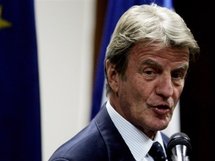
French Foreign Minister Bernard Kouchner
Kouchner attributed the new climate to the launch of US-mediated indirect peace talks between Israel and the Palestinians, as well as to a "clarification" of Iran's controversial nuclear programme.
"We cannot be resigned to a constant state of tension, even if it is decreasing," he told journalists on his plane to Beirut after a meeting in Damascus earlier on Sunday with Syrian President Bashar al-Assad.
In Beirut, Kouchner held talks with President Michel Sleiman and Prime Minister Saad Hariri before continuing on to Cairo to meet his Egyptian and Spanish counterparts, Ahmed Abul Gheit and Miguel Angel Moratinos.
"Minister Kouchner informed the president that his regional tour aims to ease recent tension, which began to decline over the past few days especially as concerns Israel's threats," Sleiman's office said after the meeting.
France's foreign minister, briefing reporters travelling with him, renewed an appeal for all sides to respect UN Security Council Resolution 1701 which ended a devastating month-long war in 2006 between Israel and Lebanon's Shiite militant group Hezbollah.
The resolution bans the supply of arms to the Iranian- and Syrian-backed Hezbollah.
In Damascus, Kouchner expressed France's concern over Hezbollah's weaponry, to which Assad gave assurances it was not in the interests of Damascus, Tehran or Hezbollah to trigger a new conflict, a French diplomatic source said.
The source, asking not to be named, said that France as a peace broker also wanted to encourage Syria not to facilitate the delivery of arms to Hezbollah.
Israeli President Shimon Peres sparked controversy last month when he accused Syria of supplying Hezbollah with Scud missiles, a charge Damascus has staunchly rejected.
In his meeting with Kouchner, Assad accused the West of overlooking Israeli violations in the region.
"The region has changed and the West's policy in the area is no longer acceptable, keeping silent over Israeli violations is no longer acceptable," Syria's official news agency SANA quoted Assad as saying.
"If the West wants security and stability to be established in the Middle East, they (Western countries) must start to play an effective role to contain Israel and put an end to its extremist policies," Assad said.
He also told Kouchner that countries pushing for UN sanctions against Iran should change their stance, because Tehran's nuclear programme was for civilian purposes, SANA reported.
"The countries concerned should modify their approach concerning Iran's civilian nuclear programme," he said.
Assad said an accord signed in Tehran last week after three-way talks with the leaders of Brazil and Turkey, whereby Iran would swap its low-grade uranium for enriched nuclear fuel, was an important step towards a diplomatic solution.
On Saturday, Kouchner said Iran was still courting sanctions despite the nuclear fuel accord because it still refused to stop uranium enrichment as demanded by UN Security Council resolutions.
---------------------------------------------------------------------------------
"We cannot be resigned to a constant state of tension, even if it is decreasing," he told journalists on his plane to Beirut after a meeting in Damascus earlier on Sunday with Syrian President Bashar al-Assad.
In Beirut, Kouchner held talks with President Michel Sleiman and Prime Minister Saad Hariri before continuing on to Cairo to meet his Egyptian and Spanish counterparts, Ahmed Abul Gheit and Miguel Angel Moratinos.
"Minister Kouchner informed the president that his regional tour aims to ease recent tension, which began to decline over the past few days especially as concerns Israel's threats," Sleiman's office said after the meeting.
France's foreign minister, briefing reporters travelling with him, renewed an appeal for all sides to respect UN Security Council Resolution 1701 which ended a devastating month-long war in 2006 between Israel and Lebanon's Shiite militant group Hezbollah.
The resolution bans the supply of arms to the Iranian- and Syrian-backed Hezbollah.
In Damascus, Kouchner expressed France's concern over Hezbollah's weaponry, to which Assad gave assurances it was not in the interests of Damascus, Tehran or Hezbollah to trigger a new conflict, a French diplomatic source said.
The source, asking not to be named, said that France as a peace broker also wanted to encourage Syria not to facilitate the delivery of arms to Hezbollah.
Israeli President Shimon Peres sparked controversy last month when he accused Syria of supplying Hezbollah with Scud missiles, a charge Damascus has staunchly rejected.
In his meeting with Kouchner, Assad accused the West of overlooking Israeli violations in the region.
"The region has changed and the West's policy in the area is no longer acceptable, keeping silent over Israeli violations is no longer acceptable," Syria's official news agency SANA quoted Assad as saying.
"If the West wants security and stability to be established in the Middle East, they (Western countries) must start to play an effective role to contain Israel and put an end to its extremist policies," Assad said.
He also told Kouchner that countries pushing for UN sanctions against Iran should change their stance, because Tehran's nuclear programme was for civilian purposes, SANA reported.
"The countries concerned should modify their approach concerning Iran's civilian nuclear programme," he said.
Assad said an accord signed in Tehran last week after three-way talks with the leaders of Brazil and Turkey, whereby Iran would swap its low-grade uranium for enriched nuclear fuel, was an important step towards a diplomatic solution.
On Saturday, Kouchner said Iran was still courting sanctions despite the nuclear fuel accord because it still refused to stop uranium enrichment as demanded by UN Security Council resolutions.
---------------------------------------------------------------------------------









 Home
Home Politics
Politics









